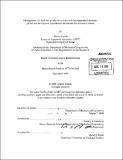Management of a high mix production system with interdependent demands: global and decomposed optimization approaches for inventory control
Author(s)
Facelli, Alberto
DownloadFull printable version (9.925Mb)
Other Contributors
Massachusetts Institute of Technology. Dept. of Mechanical Engineering.
Advisor
Stanley B. Gershwin.
Terms of use
Metadata
Show full item recordAbstract
In this work the management of a production system with a high mixture of products, interdependent demands and optional components is analyzed. An approach based on reorder point policy is proposed for both raw parts and finished goods inventory control. In the latter case, the solution of an optimization problem determines whether each product should be held in inventory and if so which safety factor z should be used. The choice of z, and as a consequence of the reorder level R, takes into consideration the demands interdependence, the customer's availability to buy if a certain waiting time is quoted to them and the fact that in a certain type of orders the optional components are required to ship. Global and decomposed optimization approaches are presented and compared. The decomposed approach is shown to achieve performances very close to the ones of the global optimization with much easier computations. By using the policy based on the decomposed optimization, it is possible to reduce simultaneously the value of the inventory and the expected number of lost sales as compared to a simple reorder point policy or to the policy currently in use at the company. A reduction of 35% of inventory and of almost 10 times of the average value of lost sales is expected if the company substitutes the current policy with the proposed one.
Description
Thesis (M. Eng.)--Massachusetts Institute of Technology, Dept. of Mechanical Engineering, 2009. Includes bibliographical references (p. 118-120).
Date issued
2009Department
Massachusetts Institute of Technology. Department of Mechanical EngineeringPublisher
Massachusetts Institute of Technology
Keywords
Mechanical Engineering.